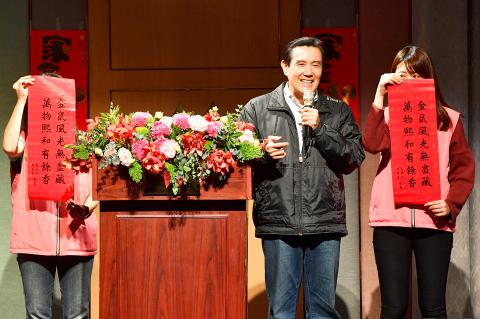China has to take responsibility for skewing the so-called “1992 consensus,” former president Ma Ying-jeou (馬英九) said yesterday, adding that Beijing omitted “different interpretations” and only focused on “one China.”
Ma made the remarks when asked about discussion within the Chinese Nationalist Party (KMT) following its losses in the Jan. 11 presidential and legislative elections about whether the party should improve or abandon the “1992 consensus.”
The “1992 consensus” — a term that former Mainland Affairs Council chairman Su Chi (蘇起) in 2006 admitted making up in 2000 — refers to a tacit understanding between the KMT and the Chinese Communist Party that both sides of the Taiwan Strait acknowledge that there is “one China,” with each side having its own interpretation of what “China” means.

Photo: CNA
“Both Taiwan and the Mainland have agreed to the consensus — otherwise, there would be no consensus. I think everyone misunderstands the consensus. It is, of necessity, a Taiwanese consensus and also one across the Taiwan Strait — only then would it have any effect,” Ma said yesterday.
The “consensus” benefits Taiwan by offering it flexibility and echoing the “one China” principle as stated by the Republic of China (ROC) Constitution — both of which enable cross-strait interaction, Ma added.
“I think the Mainland has to take certain responsibility for the misunderstanding, as it has placed too much emphasis on ‘one China’ and forgets there is the component ‘each side having its own interpretation,’” Ma said, adding that not clearing up the matter would make cross-strait relations increasingly difficult.
In a related development, KMT Youth League head Hsiao Ching-yan (蕭敬嚴) on Friday proposed that the party should move away from pro-unification discourse.
Taiwanese have “achieved consensus in refusing to acknowledge the legitimacy of the 1992 consensus,” Hsiao said in an interview with the China Review News Agency, adding that the party should find a new consensus, one that is anti-unification.
While acknowledging that his view was similar to the Democratic Progressive Party’s (DPP), Hsiao said that, based on his observations, any variation of the “1992 consensus” — as long as it contained the same “one China with separate interpretations” spirit — would likely be rejected by Taiwanese.
Hsiao added that his observations showed that Taiwanese agree with three concepts: “the ROC is in Taiwan,” “independent sovereignty should not be violated” and “unification should be adamantly opposed.”
Given this, Hsiao urged the party to base its cross-strait discourse on these three concepts.
However, KMT Central Advisory Committee member Chang Ya-ping (張雅屏) slammed Hsiao’s suggestion.
The KMT is “the defender of the ROC” and the Constitution is the “Constitution of the ROC,” which supports the “one China” ideology, Chang said.
The KMT must defend the Constitution and becoming anti-unification is to “deny the legitimacy of the ROC Constitution,” he said, adding that any person who refuses to defend the Constitution should resign from the KMT.
An Internet user said that it was perplexing that such a good idea from Hsiao — one that could win the party votes from the younger generation — should be met with such hostility by the party’s leadership.
Pro-unification supporters in the KMT should leave Taiwan, another netizen said.

ANOTHER EMERGES: The CWA yesterday said this year’s fourth storm of the typhoon season had formed in the South China Sea, but was not expected to affect Taiwan Tropical Storm Gaemi has intensified slightly as it heads toward Taiwan, where it is expected to affect the country in the coming days, the Central Weather Administration (CWA) said yesterday. As of 8am yesterday, the 120km-radius storm was 800km southeast of Oluanpi (鵝鑾鼻), Taiwan’s southernmost tip, moving at 9kph northwest, the agency said. A sea warning for Gaemi could be issued tonight at the earliest, it said, adding that the storm is projected to be closest to Taiwan on Wednesday or Thursday. Gaemi’s potential effect on Taiwan remains unclear, as that would depend on its direction, radius and intensity, forecasters said. Former Weather Forecast

As COVID-19 cases in Japan have been increasing for 10 consecutive weeks, people should get vaccinated before visiting the nation, the Centers for Disease Control (CDC) said. The centers reported 773 hospitalizations and 124 deaths related to COVID-19 in Taiwan last week. CDC Epidemic Intelligence Center Director Guo Hung-wei (郭宏偉) on Tuesday said the number of weekly COVID-19 cases reported in Japan has been increasing since mid-May and surpassed 55,000 cases from July 8 to July 14. The average number of COVID-19 patients at Japan’s healthcare facilities that week was also 1.39 times that of the week before and KP.3 is the dominant

The Chinese Communist Party’s (CCP) working group for Taiwan-related policies is likely to be upgraded to a committee-level body, a report commissioned by the Mainland Affairs Council (MAC) said. As Chinese President Xi Jinping (習近平) is increasingly likely to upgrade the CCP’s Central Leading Group for Taiwan Affairs, Taiwanese authorities should prepare by researching Xi and the CCP, the report said. At the third plenary session of the 20th Central Committee of the CCP, which ended on Thursday last week, the party set a target of 2029 for the completion of some tasks, meaning that Xi is likely preparing to

US-CHINA TRADE DISPUTE: Despite Beijing’s offer of preferential treatment, the lure of China has dimmed as Taiwanese and international investors move out Japan and the US have become the favored destinations for Taiwanese graduates as China’s attraction has waned over the years, the Ministry of Labor said. According to the ministry’s latest income and employment advisory published this month, 3,215 Taiwanese university graduates from the class of 2020 went to Japan, surpassing for the first time the 2,881 graduates who went to China. A total of 2,300 graduates from the class of 2021 went to the US, compared with the 2,262 who went to China, the document showed. The trend continued for the class of 2023, of whom 1,460 went to Japan, 1,334 went to